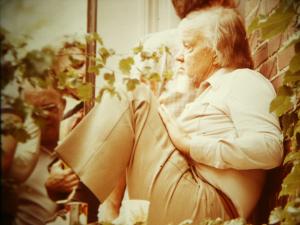Despite the title of the blog, we’ve only reviewed works by Francis Schaeffer a few times. I hope to change this down the road–Schaeffer would seem to be a natural follow-up to Kuyper. Until there, it will have to be a smattering of random reviews, such as this one of the Letters of Francis Schaeffer, edited and introduced by Lane T. Dennis.

Davis has made some interesting-but-necessary editorial decisions in presenting these letters. Interesting, because most of us who write letters (or emails, or Facebook posts, or whatever the contemporary equivalent these days is to the letter) don’t think about what they might look like forty years from now, and bringing any kind of order to them is always going to be a challenge. Necessary, first because Schaeffer himself had specific requests for how his letters were to be treated (including removing all personal identification about the recipients); second because Schaeffer destroyed most of his early letters, leaving a huge gap in the record; and third because even with many of his letters destroyed, there were still thousands of remaining letters that had to be skimmed down. The book has to be kept manageable, and Dennis has certainly given us as readers something we can use. I suppose without seeing what has been omitted we can’t know whether what we have is a representative sample, but the letters in this volume are certainly consistent with the rest of what I’ve read of Schaeffer’s works.
More specifically, Dennis has broken the letters here into three sections: the first on spiritual awakening and the experience of true spirituality, the second on what the Christian life looks like in practice, the third on the application of ‘spiritual reality’ to marriage, family, and sex. Most of these letters were written either at the height of the sexual revolution in the 1960s, or in the wake of the ongoing devastation it has left behind in the decades after. So for example, Schaeffer was responding to the early days of the homosexual rights movement. He writes regarding the question of homosexuality:
“There are two mistakes that can be made. The first is to fall into the modern relativism that would say homosexual practice is not wrong–in the same way that they would say heterosexual relationships outside of marriage are not wrong. The thought behind both of these is the same: that the Bible is not counted as an absolute, and what nature decrees is right. In other words, no account is taken of the Fall.
The opposite mistake is the one that the orthodox people have made. That is, that homophile tendencies are sin in themselves even if there is no homosexual practice. Therefore the homophile tends to be pushed out of human life (and especially orthodox church life) even if he does not practice homosexuality. This, I believe, is both cruel and wrong. We who are heterosexual have sexual temptations which we do not give in to by the grace of God. And, if this is so, then in neither case should it be called sin.” (194)
This would put Schaeffer somewhere near the Revoice crowd in our own time, if not fully on board with everything they are doing.
Schaeffer also writes about the church. What should we look for and pray about in our local congregations?
“First, there should be an ‘orthodoxy of doctrine’–that is, it should be Bible-believing in the full sense of the term.
Second, there should be an ‘orthodoxy of community.’ This means that people would care for each other in the whole spectrum of life, including financially if this is needed…
Third, after these two points are met, then you must find a church which meets your personal needs. Theoretically all churches should meet all people’s needs, but in a fallen world this is not possible. Some people, for example, like one kind of music and some another; some like one kind of preaching and some another. Some churches meet the needs of certain individuals, but not the needs of others….
Two further things must be said simultaneously: first, we must not accept what is poor; second, however, if we will only accept what is perfect or else nothing at all, we will always get the nothing in this fallen and abnormal world. This is true in our personal lives, in our marriages, in our churches, and in everything else. Keeping this balance is one of the most difficult things in the Christian’s life, but we must look to the Lord to try to keep the balance.” (147-148)
Gems like these abound throughout. While this isn’t necessarily the place to start reading Schaeffer, the Letters of Francis A. Schaeffer is worth every Christian’s time and attention.
Dr. Coyle Neal is co-host of the City of Man Podcast and an Associate Professor of Political Science at Southwest Baptist University in Bolivar, MO












